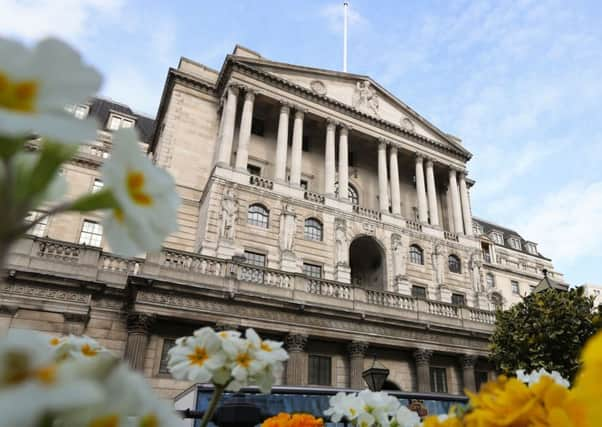Sterling surges as BoE moves closer to rates hike
This article contains affiliate links. We may earn a small commission on items purchased through this article, but that does not affect our editorial judgement.


The minutes of the June meeting of the MPC showed an unexpectedly finely-balanced vote of 5-3 in favour of keeping base rates at their current historically low levels of 0.25 per cent.
• READ MORE: Markets and economy news
On the currency markets, the pound surged 0.7 per cent against the euro to €1.444 – its highest level since the general election. Against the dollar, sterling was up 0.05 per cent at about $1.275.
Advertisement
Hide AdAdvertisement
Hide AdThe pound’s strength weighed on the FTSE 100, which fell 0.7 per cent or 55.04 points to end the day at 7,419.36.
Against a backdrop of steadily rising UK inflation, the minutes showed that Ian McCafferty and Michael Saunders joined former rate rebel Kristin Forbes in voting for a quarter-point rise.
The surprise voting split marked the first time that three members have dissented for more than six years. Their call comes as the Bank cautioned that inflation is set to rise more than it predicted in last month’s forecasts and is now likely to increase above 3 per cent by the autumn.
• READ MORE: Holiday costs push inflation towards four-year high
Inflation is currently at a near four-year high of 2.9 per cent. City economists were split on whether the MPC dissension means rates will be hoisted sooner than expected.
James Knightley, senior economist at investment bank ING, said rates were still unlikely to go up any time soon, adding: “Given the BoE ‘looked through’ inflation at 5 per cent plus in 2008 and 2011, we think the committee as a whole will look through this spike too.
“The economic and political uncertainty, we believe, is too great to get a consensus behind higher rates and with Kristin Forbes leaving the BoE this month, the hurdle to getting that consensus will soon be harder to achieve.”
Advertisement
Hide AdAdvertisement
Hide AdBut Ben Brettell, senior economist at broker Hargreaves Lansdown, said there was a chance of monetary tightening if inflation continues to rise.
He said: “It seems the willingness of the MPC to ‘look through’ higher inflation and leave rates on hold is wearing thin, and if inflation continues to surprise we could see higher rates by the end of the summer.”
Rates were slashed from 5.75 per cent to just 0.5 per cent between December 2007 and March 2009 in the wake of the financial crash and recession. They were cut by another quarter-point last summer shortly after Britain’s shock Brexit vote.
Yesterday’s update followed official data earlier this week showing that inflation surged in May beyond City expectations, putting it well above the BoE’s mid-term target of 2 per cent.
The Bank said the pound’s weakness since the indecisive general election result would add to the pressure on inflation as sterling’s fall since the Brexit vote has sent the cost of imported goods soaring.
• Retail sales fell more sharply than expected in May as shoppers felt the impact of rising inflation, official data shows.
The Office for National Statistics (ONS) said sales volumes between April and May fell 1.2 per cent, as inflation hit 2.9 per cent.
Advertisement
Hide AdAdvertisement
Hide AdSales volumes were up by 0.9 per cent on a year ago, the weakest annual growth rate since April 2013. Average store prices excluding fuel increased by 2.8 per cent on the year – the largest growth since March 2012.
ONS senior statistician Ole Black said: “We have not seen lower growth on the year since April 2013. Increased retail prices across all sectors seem to be a significant factor.”
Non-food stores were the main contributor to the slowdown, with an annual sales fall of 1.2 per cent.
Ian Geddes, Deloitte’s head of retail, said: “This suggests that retailers are having to pass some of the cost pressure from the rising price of imported goods on to consumers.”